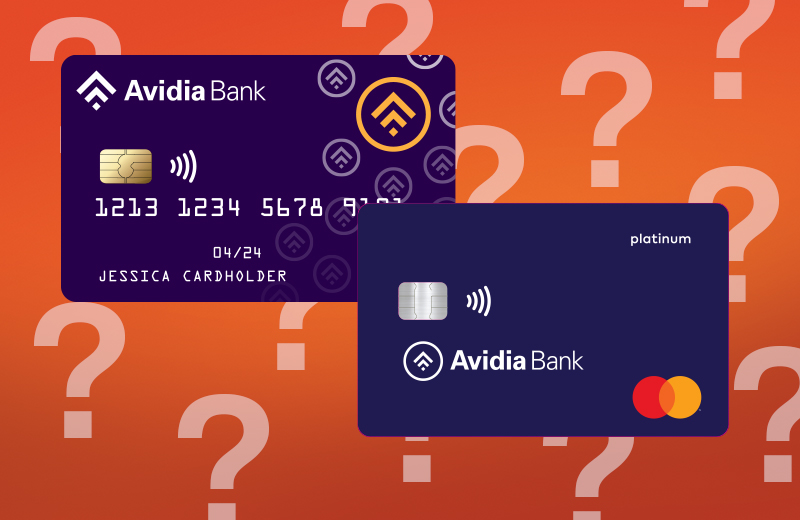Avidia Answers
July 19, 2023
Avidia Answers: Debit vs. Credit Card: What’s the Difference?

At Avidia, we l-o-v-e talking to our customers. Honestly. Hearing your feedback, concerns, and questions helps us understand how we can help you manage your money. That’s why we created a new Advice feature, “Avidia Answers,” to respond to common customer questions from our customers.
This week’s question: What’s the difference between a debit and credit card?
It’s a good one since both cards kinda look alike and take up the same amount of space in your wallet. And they both make shopping easy, fast, and secure.
They are, however, different in some pretty important ways. Let’s take a look.
Where does the money come from?
The biggest difference between a debit and a credit card is the source of funds. With a debit card, you’re using your money, the funds in your checking account, to make purchases. With a credit card, however, you’re tapping into a line of credit offered by a financial institution (like say, a really cool and honest orange one).
The deal with debit cards
When you use a debit card to make a purchase, the store or merchant sends the transaction to your bank. Your bank then takes money from your checking account and sends money to the merchant’s account.
Advantages/disadvantages of debit cards:
Debit cards offer some great benefits:
- No debt buildup. With a debit card, you’re using your money to make purchases, so you won’t have to worry about getting a big bill each month.
- Savings. You won’t have to pay an annual fee or interest charges, which can really add up with credit cards.
- Access to ATMs. You can use your debit card to get cash at ATMs.
- Convenient access to savings. If you have a savings account, you may be able to use your debit card to access funds, too.
The disadvantages include:
- It won’t build your credit. If you’re looking to establish credit or build your credit score, a debit card won’t help you.
- The amount you spend is limited. You can only spend what’s available in your checking account.
- Overdrafts could happen. It’s easy to overdraw your account with purchases, so you must keep track of the available balance in your checking account at all times to avoid fees.
Let’s talk credit cards
When you pay with your credit card, you’re borrowing from a line of credit offered by a lender. The maximum amount you can borrow is known as your credit limit. When you pay with a credit card, you agree to pay back the amount you borrow along with any interest charges you may incur.
Advantages/disadvantages of credit cards:
When you use a credit card, you’ll enjoy these benefits:
- A grace period on purchases. You have until the end of a billing cycle to pay for purchases you made in the last 30 days. So, depending on when you made the purchase, you could have several weeks to pay the money back without interest.
- A way to build your credit. A credit card is a great way to establish credit. Every time you make a payment on time, it helps boost your credit score.
- Access to emergency funds. With a credit card, you have access to a line of credit when you need it. So, if you get hit with an unexpected expense, like a medical bill or car repair, you have a way to pay for it.
- Enhanced purchase protection. Though debit cards offer protection for unauthorized purchases, credit cards offer another level of protection: fraud liability, which makes a credit card a safe and smart way to pay for online purchases.
The disadvantages include:
- With a credit card, it’s easy to spend money you don’t have. When using your card, you must have the discipline to pay off as much of the balance as you can and buy only what you can afford.
- High interest and fees. If you don’t pay off your purchases in full at the end of your billing cycle, you’ll end up paying a high rate of interest. Plus, there are costly fees like annual and late fees.
- Debt buildup. Speaking of things that add up, if you make just minimum payments, you’ll likely end up accumulating credit card debt, which is never a good thing.
Debit card or credit card: What’s the right answer for you?
Honestly, it’s a good idea to carry both. A debit card is ideal for making everyday purchases, so you don’t have a large bill at the end of the month. And credit cards are great for emergencies, online purchases, and larger items that you need more time to pay off.
We’ve got the cards you need
At Avidia, we have debit and credit cards to answer your financial needs. Talk to us today.